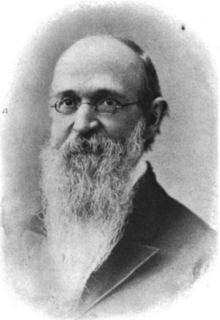Henry M. Parkhurst

Henry Martyn Parkhurst (March 1, 1825 - January 21, 1908) was an American stenographer who served as Chief Official Court Reporter for the US Senate, an astronomer with pioneering work in Photometry, and an author.[1][2][3] Parkhurst was an advocate of "Dianism". [3]
Early life
Henry M. Parkhurst was born on March 1, 1825 to Rev. John L. Parkhurst. His cousin was Rev. Dr. Charles H. Parkhurst.[4]
Stenographer
While typical stenographers record the words spoken, Parkhurst became a "phonographic recorder", writing not the words but rather the sounds which were spoken.[5] Parkhurst devised a modification of Pittman's phonography which Parkhurst called "Stenophonography".[1] An advocate for spelling reform, Parkhurst published The Plowshare for forty years, using a special alphabet "in which each character stood for a single sound and each sound was represented by a single character."[1]
In 1847, he served as reporter for the Female Anti-Slavery Society of Salem.[6][7]From 1848 to 1854, Parkhurst was the Chief Official Court Reporter for the US Senate.[1][8]
Astronomy
At a young age, Parkhurst observed the Great Comet of 1843. In the 1870s, he published a journal article describing a new photometric mapping device that could record the location and magnitude of stars. In 1893, ten years of his observations were published in the Harvard Annals.[9][10] From 1883 to 1907, he conducted research into long period variable stars. [11] Beginning in 1887, he conducted a survey of asteroids. [11]
Paranormal investigator
In 1867, Parkhurst investigated purported-clairvoyant Mollie Fancher, and after which he wrote multiple statements attesting to her abilities. In 1878, Parkhurt publicly attested to Fancher's abilities in a letter to the editor of the New York Herald.[12][13][14]
Dianism
In 1887, Henry M. Parkhurst anonymously published 'Diana', a pamphlet that taught the practice of Dianaism. [15][16][17] The pamphlet was written in "reform spelling".[18] Parkhurst named his practice after the goddess of chastity. [17] Parkhurst drew inspiration from radical religious philosopher John Humphrey Noyes.[17]
Parkhurt later took credit for the pamphlet, authoring "Why I Wrote 'Diana'".[15]
Elmina Slenker was a "prominent promoter of the 'Diana method' of continence and distributor of the pamphlet Diana which explained to readers how to practice sexual expression without fears of conception".[19] She was arrested under obscenity laws. Parkhurst briefly took the stand in her defense at her trial.[15]
Influence
Sex reformer Ida Craddock advised study of "Alpha-ism" and Dianism [20] [18] "Diana", a pamphlet by "Prof. Parkhurst, the astronomer, and published by the Burnz Publishing Co., New York".[18]
In 1908, Parkhust died. That year, an in-depth profile of Parkhurst was published in Popular Astronomy, penned by Yerkes Observatory astronomer John Adelbert Parkhurst (no relation).[11]
Works
References
- 1 2 3 4 "1908PA.....16..231P Page 231". adsabs.harvard.edu.
- ↑ "Parkhurst Henry Martyn 1825 1908 - AbeBooks". www.abebooks.com.
- 1 2 Chappell, Vere (1 December 2010). "Sexual Outlaw, Erotic Mystic: The Essential Ida Craddock". Weiser Books – via Google Books.
- ↑ "The Brooklyn Daily Eagle from Brooklyn, New York on January 22, 1908 · Page 3".
- ↑ Cima, Gay Gibson (24 April 2014). "Performing Anti-Slavery: Activist Women on Antebellum Stages". Cambridge University Press – via Google Books.
- ↑ Ernest, John (1 August 2017). "The Oxford Handbook of the African American Slave Narrative". Oxford University Press – via Google Books.
- ↑ Garrison, Wendell Phillips; Garrison, Francis Jackson (1 August 1894). "William Lloyd Garrison, 1805-1879: The Story of His Life Told by His Children..." Houghton, Mifflin – via Google Books.
- ↑ "The Phonographic Magazine". The Institute. 1 August 1890 – via Google Books.
- ↑ Williams, Thomas R.; Saladyga, Michael (26 May 2011). "Advancing Variable Star Astronomy: The Centennial History of the American Association of Variable Star Observers". Cambridge University Press – via Google Books.
- ↑ Observatory, Harvard College (1 August 1893). "Annals of the Astronomical Observatory of Harvard College". Hetcalf and Company – via Google Books.
- 1 2 3 "Popular Astronomy". Goodsell Observatory of Carleton College. 1 August 2017 – via Google Books.
- ↑ "The Arena". Arena Publishing Company. 1 August 1895 – via Google Books.
- ↑ Laurence, Lauron William De (1 August 2017). "Clairvoyance and Thought-transference". De Laurence – via Google Books.
- ↑ Hammond, William Alexander (1 August 1879). "Fasting Girls: Their Physiology and Pathology". Library of Alexandria – via Google Books.
- 1 2 3 Schmidt, Leigh Eric (26 September 2016). "Village Atheists: How America's Unbelievers Made Their Way in a Godly Nation". Princeton University Press – via Google Books.
- ↑ Brumberg, Joan Jacobs (1 August 2017). "Fasting Girls: The History of Anorexia Nervosa". Vintage Books – via Google Books.
- 1 2 3 Passet, Joanne Ellen (1 August 2017). "Sex Radicals and the Quest for Women's Equality". University of Illinois Press – via Google Books.
- 1 2 3 Chappell, Vere (1 December 2010). "Sexual Outlaw, Erotic Mystic: The Essential Ida Craddock". Weiser Books – via Google Books.
- ↑ "SEX RADICALS IN AMERICA'S HEARTLAND : REDEFINING GENDER AND SEXUALITY, 1880-1910" (PDF). Mospace.umsystem.edu. Retrieved 2017-08-20.
- ↑ Craddock cites: "The Christian Life", a journal edited and published by Rev. J.D. Caldwell, Chicago
- 1 2 "Parkhurst, Henry M. (Henry Martyn), 1825- - The Online Books Page". onlinebooks.library.upenn.edu.